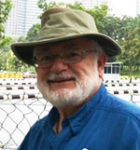
RICHMOND, California — I owned a Kodak Brownie, 16 mm Minox, Petri, Minolta, film in a box, Cannon and a Polaroid. Karen had an Olympus and a Fuji. Between us we have owned three Cannons. Fabled German Leica, Hasselblad and Rolleiflex were beyond financial reach and skill set. I’ve known several professional photographers, I’m not them. Then came the digital revolution and I got a small Cannon and in 2016 a Nikon. Today my Apple 11 cellphone is quite adequate for taking pictures for publication in books, magazines and newspapers. We have gone from point, shoot, and develop to point and shoot with no concern for lens opening, shutter speed, cost of film and processing
Sepia toned, black and white, color and iPhone images record five generations of our English, German, Austrian, Canadian, Israeli and American family. The black and white portraiture of Wisdom Magazine held my attention from 1956 to 1964. Reading “National Geographic” (1993) by Catherine Lutz revealed the American icon’s photo selection process.
When my mother downsized in the 1990s she gave me her photo albums with pictures going back to the late 1800s. What a treasure of mostly anonymous images of my great grandparents’ generation. Facial similarities give some hints.
We moved to Richmond in 2016 and put the photos, albums and slides in the most inaccessible crawl space under the stairs in the basement, good for playing hide and seek and avoid dealing with the two bankers boxes of loose photographs, 26 albums, one scrapbook, and thousands of slides taken between 1965 and the mid-1980s along with several carousels. Covid-19, our sense of mortality, and the concern that this would all end in a dumpster, compel our attempt to make sense of it. Its daunting. This episode is about the loose photos.
Our wedding, our two son’s weddings, baby’s first year, birthday parties, Bar Mitzvahs, anniversaries, retirement parties were fun and easy to arrange. We did not recognize all the faces, likely from the other side of the family rather than party crashers.
What are we saving this for? Do we really think our children and grandchildren glued to the cellphone and laptop will want five generations of photos? Grandkids have used our cameras at the zoo but it did not lead to enduring interest. Technology, time allocation, and interests have changed. Screen time, Facebook and YouTube dominate. Watch the troubling 2020 documentary “The Social Dilemma.”
This is probably the third time I have tried to make sense of the pile. I enlisted Karen, she is crucial for the memory of faces and places. Most of the pictures are of her family safely ensconced in Canada and America since around 1900. Most of my emigrant family photos were lost when my parents fled Germany and Austria in the 1930s.
First cut, if we could not identify the people, out with it. Second cut, if it was an event about a child, give it to the child. Third cut, share with friends and family in the picture. Placing them on eBay is not an option. Don’t keep negatives, Grandpa what’s a negative? Our task is tinged with nostalgia, being reminded of cousins, aunts and uncles, many no longer living, honoring our ancestors, and identifying where we came from.
There are separate sections for the maternal and paternal line, Goldstein and Atkin; and Bachmann, Borgzinner which became Bonner, and Pollak. Children married and introduced Yabek and Shtromberg wives and ever-expanding grandchildren milestones.
A-Z, Aaron, Joyce Appleby (Omahan and San Diegan), to Zimbabwe (formerly Rhodesia) with topics in between including birds, camping, flowers, friends, gravestones, high school, Israel, law office, Navy, university colleagues, and vacations. The pet file (two cats Mindon and Ketzela, two dogs, Isis and Tasha), is perhaps the most endearing. we have been resolutely and unwaveringly pet less since 2010, no more dander, whiskers, hair and litterbox). My research files contain many more images.
We are organizing, downsizing and outsourcing, and looking forward to when we can freely visit and show the parties in interest our photographic connections. I am not ignoring our albums and thousands of slides, it’s just too daunting to grapple with all at once.
*
Oliver B. Pollak, Ph.D., J.D., a professor emeritus of history at the University of Nebraska Omaha, and a lawyer, is a correspondent now based in Richmond, California. The author is a member of the Institute for Historical Study. He may be contacted via oliver.pollak@sdjewishworld.com